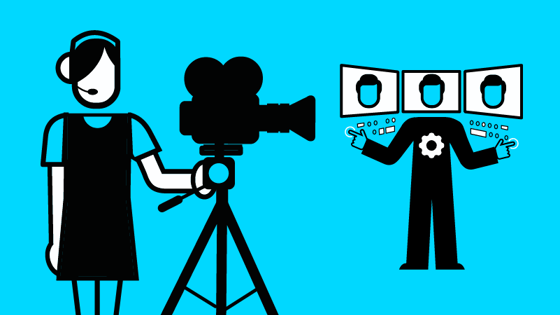Broadcast engineering
Broadcast technical consultant

What does a broadcast technical consultant do?
Broadcast technical consultants advise broadcast companies on the best way to develop their technology within the space and budget available. So, they might help a TV company design a new fleet of vans used for outside broadcasts, build a studio in a sports venue where matches and races are filmed, or construct a playout centre where finished TV programmes are broadcast to homes. Broadcast technical consultants also advise companies that build technical equipment, helping them to create the best products for broadcast companies to buy.
Broadcast technical consultants usually start by learning about the company they’re working with and its plans. Then they write a report for the bosses to consider, explaining the different options for, say, a new building, vehicle or studio, what each option costs and how easy they think it would be to build. They use the company’s feedback to come up with a basic idea, which evolves into a detailed plan for the new piece of equipment.
When plans are approved and the project begins, broadcast technical consultants become an essential part of the project team. They are on hand to give advice until the new tech is up and running.
Broadcast technical consultants may also get involved with major projects such as finding the best way to film concerts from a new arena or advising on innovative technology to broadcast the next Olympic games. They might be invited by companies to the launch of their latest equipment and attend conferences to discuss new technology.
Broadcast technical consultants work with broadcast organisations all over the world. Many communicate in English, but if you want the opportunity to discover new cultures and languages, as well as new technology, this could be the job for you.
Watch and read
- Consultancy in broadcasting with broadcast consultant Mark Johnson
- Life as a broadcast engineer – interview with Dan Storr
- Tech used on I’m a celebrity 2020 – Gravity Media
What is a broadcast technical consultant good at?
- Communication: writing clear reports in language a company without engineering knowledge will understand
- Technical knowledge: keeping up to date with new ideas and products that are being developed
- Business knowledge: understanding how new vehicles, buildings and equipment can help the company and how much they cost to set up and look after
- People skills: being friendly and professional with a network of contacts; guiding a team of staff.
Who does a broadcast technical consultant work with?
Because this is a high-level job, broadcast technical consultants often have staff working for them. They are often freelance and work with a network of contacts who have particular knowledge and skills they can share, whether that’s vision systems, networks, sound, graphics or specialist broadcast software. They provide information about the latest technology, new equipment likely to come to market and the cost and availability of these new technologies.
How do I become a broadcast technical consultant?
Broadcast technical consultants hold a very senior position and are at the top of their game when it comes to knowledge of broadcast technology, so it takes many years of experience working in broadcast engineering to get this job.
You might choose to move around the departments of broadcast engineering to gain as much knowledge and experience as possible, starting with an entry-level job like trainee software engineer or another trainee role.
If you want to become a broadcast technical consultant, you will need to get experience working in a large-project department or for a major installation company. Most importantly, you will need to find a job where you manage a team of other engineers and regularly explain technology to senior programme makers who have no engineering background.
At school or college
If you’re interested in a career in broadcast engineering, A-levels in maths, physics and computer science would be good to get under your belt. You could combine these with subjects from the arts and humanities, such as English, history or music, which may come in useful for the content of the programmes you work with. Languages are also handy if you need to travel or want to work with foreign broadcasters – studying A-level Spanish might be your ticket to working at the 2026 World Cup in Mexico!
The following Level 3 vocational qualifications are also relevant to this role:
- BTEC in Engineering with Engineering Maths
- Cambridge Technical Extended Certificate in Engineering
- BTEC National Foundation Diploma in Engineering
- C&G Technical Certificate in Engineering
- EAL Technical Diploma/Extended Diploma in Engineering Technologies
- BTEC Diploma/Extended Diploma in Electrical and Electronic Engineering
- City & Guilds Advanced Technical Diploma in Electrical Installation
- EAL Diploma/Advanced Diploma in Electrical Installation
Selected schools and colleges have also started offering T-levels – a qualification equivalent to three A-levels designed to help you get into the industry of your choice. Study is 80% classroom and 20% work placement-based.
The following T-levels would help to kick-start your career in broadcast engineering:
- Media, Broadcast and Production
- Digital Production, Design and Development
- Digital Support Services
- Digital Business Services
- Design and Development for Engineering and Manufacturing
- Maintenance, Installation and Repair for Engineering and Manufacturing
- Engineering, Manufacturing, Processing and Control
Apprenticeships
Apprenticeships are jobs with training. Search for apprenticeships in broadcast engineering with broadcasters like BBC and Sky. Go to What’s an apprenticeship? to find out more and Where can I find an apprenticeship? to find apprenticeships in your region. Alternatively, you can approach companies directly. Take a look at our list of apprenticeships to find the schemes of the main broadcasters.
The BBC has a three-year broadcast and media systems degree apprenticeship that offers a mix of practical experience and university study in all areas of media systems engineering. You may also be interested in the level 3 apprenticeship for broadcast and media systems technical operator.
Volunteer
Get involved with events in your local community, whether that’s running the sound for your school talent show, managing the special effects for an amateur dramatics society or helping out at a volunteer-run radio station.
Contact theatre productions or local music venues that can get you behind the scenes of a production environment. Anything that gives you experience in dealing with equipment in a live environment will be helpful. Voluntary experience is great for your CV, because it shows you’re enthusiastic, have technical ability and experience and you work well as part of a team.
Get a degree
A degree in a maths or science subject would stand you in good stead for entering the world of broadcast engineering. You could also look at electronic engineering, software design or computing. Go to ScreenSkills Select to find university and college courses accredited by ScreenSkills.
Look outside the industry
If you can’t or don’t want to get into broadcast engineering straight away, industries that require similar skills include telecoms, live events and radio. These would enable you to strengthen your technical abilities and gain experience with technical equipment.
A broadcast technical consultant is a managerial role, so try to find roles that provide experience with technical equipment as well as increasing responsibility within a team. For roles that have both technical and managerial aspects, look into smaller film and music video productions.
Get work experience
Write to local production companies and ask if they offer technical assistant roles. Keep an eye out for work experience opportunities at the BBC, ITV, Channel 4, Sky and the PACT Indie Diversity Training Scheme.
Alternatively, try approaching a rental equipment company that supplies productions with the gear they need. This will enable you to get your hands on equipment, learn more about it and get to know people who work in TV.
Take a short course
Check out ScreenSkills’ Training and opportunities page and click on Training to see what courses are available, whether they are in person or online. The training doesn’t have to be linked directly to broadcast engineering; for example, a short course on developing resilience would help you understand how to thrive in challenging circumstances.
Network
Get to know people in the film and TV industry by attending events such as ScreenSkills’ Open Doors. Go to Training and opportunities and use the events filter to find out what’s on. Meet professionals and ask them questions about their work, while demonstrating interest in and knowledge of the industry. Offer to provide them with your professional contact details and try to stay in touch with them. Go to Network well to learn how to do this.
Network online
Create a LinkedIn profile. See if there are Facebook pages or other social media groups for people making film and TV in your area. Create a ScreenSkills profile. There are a lot of crewing agencies that will charge you to be on their books. Sign up to the free ones initially. Wales Screen, Northern Ireland Screen and Filming in England offer free crew databases and opportunities to network in person. Find a film office near you and get connected. If you do sign up to paid sites, make sure they specialise in the areas in which you’re interested.
Search for jobs
Search for jobs on the broadcasters’ websites as well as on LinkedIn and other job-hunting websites. Make use of the ScreenSkills jobs board. You can also send a short speculative letter with your CV to technical managers or vision supervisors.
You might also be interested in...
Being an R&D engineer, systems architect or project director.
Further resources
- BritishFilm Commission list of UK studios
- Engineering Council
- Rise: Women in Broadcast
- The Institution of Engineering and Technology
- The International Trade Association for the Broadcast & Media Industry
- Society of Media Professionals, Technologists and Engineers
- International Broadcasting Convention
- The Media Production & Technology Show
- E&T (Engineering & Technology) magazine
- NEP UK and Ireland
- Broadcast – Tech Talks
- Broadcast Buddy TV YouTube channel
- BBC Research and Development
- BBC Academy
- ITV Entry Careers
- Sky early careers
- 4Skills (Channel 4)
- Bectu (the media and entertainment union)
- Bectu Ratecards






